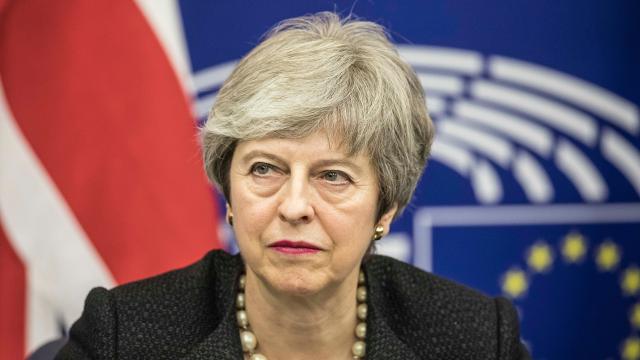The UK’s disastrous plan to implement a nationwide system blocking web users from viewing pornography unless their age and identities are confirmed by a verification service — an astonishingly ill-conceived plan being spearheaded by doddering Brexiteer Theresa May’s Tory government — is nearly a year behind schedule. But the clock is ticking, the Independent reported on Monday.
According to the Independent, “numerous” reports have suggested the UK plans to put the plan into force on April 1, while late last year, Department for Digital, Culture, Media, and Sport (DCMS) minister for digital and creative industries Margot James said it would be operating by Easter 2019. While there has been no official announcement yet, the paper wrote that the government said it will happen soon:
“This is a world-leading step forward to protect our children from adult content which is currently far too easy to access online,” a spokesperson for the [DCMS] said. “The government, and the BBFC as the regulator, have taken the time to get this right and we will announce a commencement date shortly.”
In recent days, concern has grown over the details and extent of the blocks. Numerous articles have suggested they will be introduced imminently, and posts about them have been shared thousands of times.
A separate report by Sky News emphasised that the April 1 timeline is not set in stone, but reiterated that the plan is moving forward.
When it does takes effect, all adult websites operating in the UK (in theory) will be required to direct users to a landing page without any pornographic content. Getting beyond that page will require users to acquire credentials from a recognised age verification provider — the most prominent one of which, AgeID, is owned by MindGeek, which in turn owns a sprawling network of porn sites including PornHub and RedTube. Proposed solutions to age verification have included letting companies search applicants’ social media feeds, verifying ages with text messages, having users provide official documentation like a passport, or even requiring post office employees to give out codes.
The British Board of Film Classification, which already holds immense censorship powers, will then be able to order internet service providers to block access to sites that refuse to comply.
As Wired noted, this is an awful idea for a number of reasons, including that it gives the age verification services unprecedented power to track users’ tastes in porn, and said database could somehow end up hacked or otherwise compromised.
“It’s almost impossible to do age verification without confirming your identity,” service provider Andrews & Arnold’s Adrian Kennard told New Scientist in 2017. “… This will be a gourmet feast for hackers.”
As the Register noted, while AgeID has said it would not collect user data, they have a massive conflict of interest with their ownership and could simply change their policies later.
“There is absolutely nothing written into the bill that protects any of this juicy data that users will be handing over,” Open Rights Group director and security expert Alec Muffett told Vice.
“So they may say they don’t see or store the information, but there is nothing in the law stopping them from doing whatever they want with it down the line.”
The UK government has also imposed arbitrary restrictions on paid pornography before, and there are concerns the system could be a pretext to more sweeping internet censorship. Then there’s the fact that anyone with a modicum of technological know-how and a determination to view pornography (such as the teenagers the law is supposedly designed to protect) could simply look up porn on deeper recesses of the internet or use a VPN to bypass the ban entirely.
Finally, as Wired noted, alleged polls showing that an alarming percentage of UK teens are “addicted” to pornography, and which were cited as a reason to create the system in the first place, came from a sketchy market research firm called OnePoll:
The survey company, which pays people to fill in online questionnaires on behalf of clients, is best known for salacious, headline-grabbing polls that provide results such as “German men are the world’s worst lovers”, “One in ten Brits would have an affair if they could” and “Fifty per cent of British adults think Mount Everest is in the UK”.
According to the Independent, the UK government is scheduled “imminently” to release the Online Harms White Paper, in which more information about the system may be revealed.
